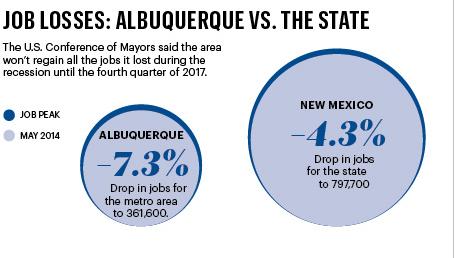
The results of yet another report on New Mexico’s film subsidy program were recently released. This study was commissioned by the New Mexico Film Office and conducted by the Canadian accounting firm MNP. It included payroll data, industry interviews, and financial reports filed with the Film Office.
The report further casts doubt on the idea that New Mexico’s generous film subsidy program will ever lead to a permanent, sustainable film industry presence in the Land of Enchantment.
According to the report, “total statewide spending on goods and services by … film and television productions declined from 2011 through 2014, with $118.7 million being spent in the 2011 budget year and $82.8 million being spent in 2014.” In addition, direct employment fell between the 2010 and 2014 fiscal years.
The value and size of New Mexico’s film and television industry also declined from $276.7 million in 2011 to $162.1 million in 2014. New Mexico residents accounted for just 46 percent of performing artists, 35 percent of “key creative” employees, and 24 percent of post-production staffers.
This is a program that is authorized to spend up to $50 million annually (any unspent funds roll over to the subsequent year) with 25% of total costs of films and 30% of television show costs being reimbursed directly to production companies. In other words, the industry is spending $82.8 million annually at a cost to taxpayers of approximately $50 million. True, $80 million is bigger than $50 million, but this is a hugely expensive way for taxpayers to generate a relatively small amount of economic activity.
Notably, New Mexico’s poor performance occurred as other states are moving away from film subsidies. Alaska’s governor, staring down a state fiscal crisis, signed legislation that repealed that state’s program. State Sen. Bill Stoltze (R-Chugiak) noted that the tax credits had “done some good things to different communities around Alaska,” but “had a pretty heavy cost to our treasury.”
Michigan has also ended incentives for the film industry and phased out funding for the state’s film office. In response, Rep. Dan Lauwers (R-Brockway Twp.) declared that it was time to “time to drop the curtain on this failed experiment,” in favor of “funding our transportation system.”
While these are relatively conservative states under Republican control, critics of film subsidies come from both sides of the political aisle and all political perspectives. A 2013 report by the liberal Citizens for Tax Justice noted, “Not only do film tax credits cost states more money than they generate, but they also fail to bring stable, long-term jobs to the state.”
This admonition is, of course, reflected in the recently-released study which found that despite ongoing and even growing subsidies, New Mexico’s film industry has shrunk in recent years.
The need for ongoing, generous subsidies is in part due to the nature of the industry. It is highly mobile and needs little in the way of permanent infrastructure. At least if a state throws money at a car company or another manufacturer (an endeavor we at the Rio Grande Foundation discourage), the company bears the expense of building a manufacturing facility and training local workers.
The film industry, on the other hand, goes where the subsidies are most generous and can pick up and leave as soon as they change. This mobility and rapid response to subsidy cuts is often cited by film industry supporters in their critiques of Gov. Martinez’s efforts to scale New Mexico’s incentive program back in 2011.
Gov. Martinez and the New Mexico Legislature should embrace sound economic principles and stop throwing money at Hollywood’s biggest and wealthiest business. Taxpayers in one of America’s poorest states shouldn’t be subsidizing Disney, Time-Warner, Fox, and other profitable corporations.
Paul Gessing is the President of New Mexico’s Rio Grande Foundation. The Rio Grande Foundation is an independent, non-partisan, tax-exempt research and educational organization dedicated to promoting prosperity for New Mexico based on principles of limited government, economic freedom and individual responsibility
























 Jay Nordlinger is a senior editor of National Review and a book fellow of the National Review Institute. He writes about a variety of subjects, including politics, foreign affairs, and the arts. He is music critic for The New Criterion. Since 2002, he has hosted a series of public interviews at the Salzburg Festival. For the National Review website, he writes a column called “Impromptus.” With Mona Charen, he hosts the Need to Know podcast, and he also hosts a podcast called “Q&A.” In 2011, he filmed The Human Parade, with Jay Nordlinger, a TV series bringing hour-long interviews with various personalities. His latest book is Children of Monsters: An Inquiry into the Sons and Daughters of Dictators. He is also the author of Peace, They Say, a history of the Nobel Peace Prize. Some 100 pieces are gathered in Here, There & Everywhere: Collected Writings of Jay Nordlinger. A native Michigander, Nordlinger lives in New York.
Jay Nordlinger is a senior editor of National Review and a book fellow of the National Review Institute. He writes about a variety of subjects, including politics, foreign affairs, and the arts. He is music critic for The New Criterion. Since 2002, he has hosted a series of public interviews at the Salzburg Festival. For the National Review website, he writes a column called “Impromptus.” With Mona Charen, he hosts the Need to Know podcast, and he also hosts a podcast called “Q&A.” In 2011, he filmed The Human Parade, with Jay Nordlinger, a TV series bringing hour-long interviews with various personalities. His latest book is Children of Monsters: An Inquiry into the Sons and Daughters of Dictators. He is also the author of Peace, They Say, a history of the Nobel Peace Prize. Some 100 pieces are gathered in Here, There & Everywhere: Collected Writings of Jay Nordlinger. A native Michigander, Nordlinger lives in New York.

